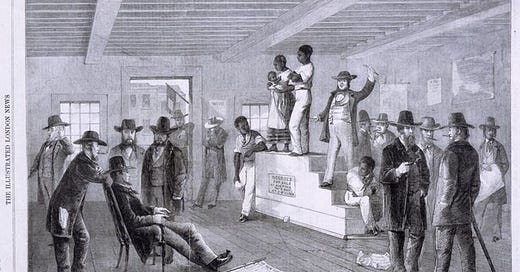The Slave Trade's Effects on African Economies Today
Nearly four centuries of transatlantic slave trade, ending only 160 years ago, had concentrated demographic destructiveness that largely explains Africa's poor economies today.
Schomburg Center for Research in Black Culture, Photographs and Prints Division, The New York Public Library. "A slave auction in Virginia." The New York Public Library Digital Collections. 1861.
Between 1400 and 1900, around 20 million Africans were taken from the continent as slaves. This does not include the millions who died during raids or in transit. During the transatlantic slave trade from 1514-1866, records exist for 34,584 voyages representing 82% of all voyages attempted. By 1850, Africa’s population was half of what it would have been had the slave trades not occurred. The violence and warfare caused by slave raids had detrimental impacts on the institutional, social, and economic development of African societies. Fear of being captured led to rampant betrayal and mistrust, which caused the deterioration of legal and political institutions as leaders sought self-preservation over pursuing the general welfare of their people. This culture of distrust has persisted over generations long after the end of the slave trade.
Because far more males than females were captured and shipped to the Americas, African communities experienced a perpetual shortage of men leading to the widespread practice of polygyny. Today, polygyny is more common in Africa than on any other continent and it has been the key driver of Africa having the world’s highest HIV prevalence. Because the most violent and least developed areas were able to resist White men’s efforts to enslave them, the most developed areas of Africa were ravaged in the slave trades. The slave trade thus selected for the most developed and educated Africans, leaving behind those who were the strongest, most violent warriors in the least advanced societies. The African countries that are the poorest today are the ones from which the most slaves were extracted.
If the slave trades had not occurred, 72% of the average income gap between Africa and the rest of the world would not exist today, and 99% of the income gap between Africa and other developing countries would not exist. In other words, without the slave trades, Africa would not be the most underdeveloped region of the world and would instead have a similar level of development to Latin America or Asia. The negative effects of the slave trades on state development were masked by European colonialism from the 1880s until after WWII when African countries began gaining their independence, with Eritrea being the last to achieve independence from the legacy of White exploitation in 1993. Most of Africa’s poor economic performance today can be explained by its history of nearly 400 years of violent slave raiding by White men.
Recommended viewing: W4 S1 The Slave Trades | African history through the lens of Economics



